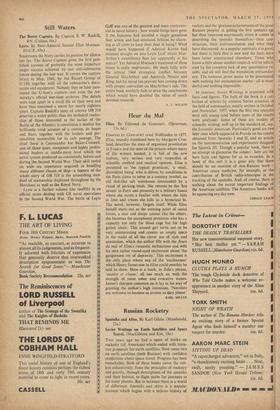Fleur du Mal
EDMOND DE GONCOURT cried Wolfenden in 1877. Elisa, soundly translated here by Margaret Cros- land, describes the state of organised prostitution in France and the state of the prisons where many of the women landed; it is full of the new realism, very serious and very respectful of scientific method and medical opinion. Elisa is presented as 'the typical prostitute,' a weak, disordered being' who is driven by conditions in the Paris slums to serve in a country brothel, an old slab-like salt warehouse surrounded by a cloud of pecking birds. She returns to the 'hot streets' in Paris and presently to a military house where she meets a fusilier with whom she falls in love and whom she kills in a hysterical fit. The novel, however, forgets itself. While Elisa herself starts out as the meeting point of social forces, a sour and sleepy animal like the others, she becomes the exceptional prostitute who has a capacity not only for blind rage but for high girlish ideals. This second girl turns out to be very uninteresting and creates an empty space in the midst of all the clever use of style and annotation, which the author fills with the flews du mat of Elisa's romantic inclinations and with his own rather round-eyed excitement about 'the gangrenous rot of depravity.' This excitement is the only place where any of the 'uncleanness' which Henry James saw in Elisa could possibly be said to show. Here is a book, in Zola's phrase, 'austere et chaste,' all too much so, with the strength of some sober and evocative scenes. James's sharpest comment on it lay in his way of granting, the author's high intentions. 'Novelists are welcome to become as serious as they please.'
KARL MILLER






































 Previous page
Previous page